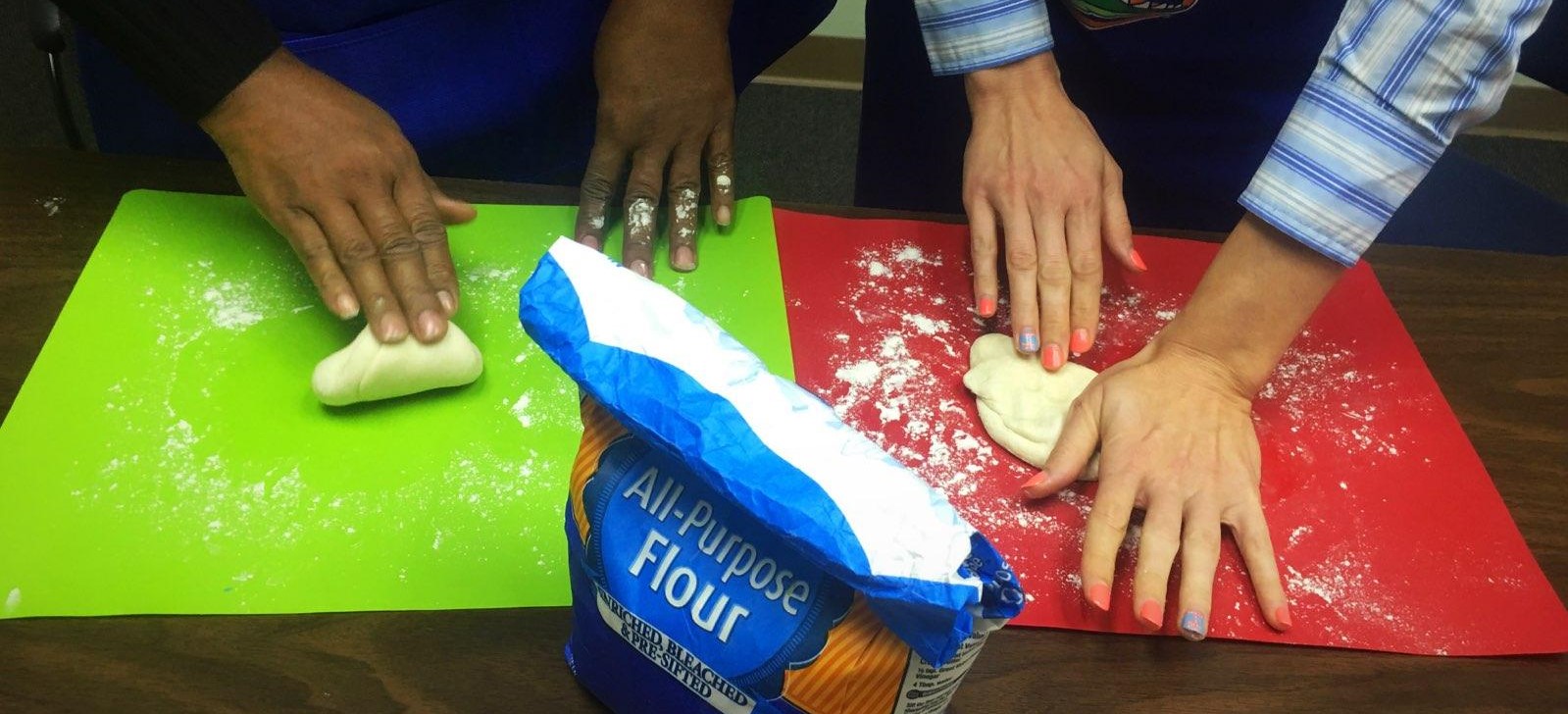
by Angela Hinkle | Nov 20, 2017
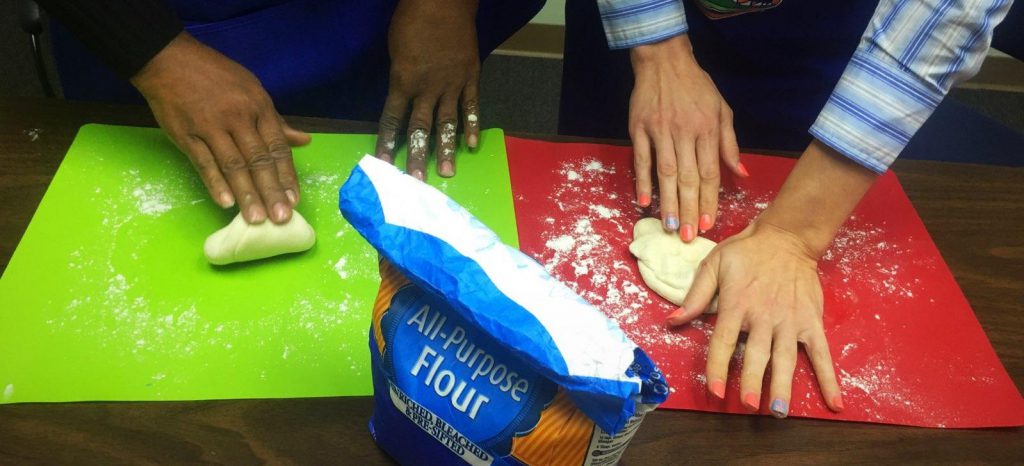
Kneading Dough
Photo credit: Angela Hinkle
One of the most beloved smells across cultures and classes is baking bread. It brings about associations of home and comfort – even among folks who have never even experienced baking bread at home! The tactile experience of touching, folding, and pushing dough – or kneading – is considered by many to be one of the most pleasant touches in the world. Kneading dough is important in making bread and rolls light, airy, and chewy. (After all, who wants flat, tough bread?) But kneading dough and baking bread also has evolved into a type of therapy that social workers and psychologists use in workshops – similar to art therapy. If you use your own kitchen, you don’t even have to go to a workshop.
Making, baking, and breaking bread together is a great way to build bonds and a sense of home and warmth. Generally speaking, when we prepare food, our hands help us to create an increased sense of self-esteem and confidence. The kneading and baking of bread in particular helps to unlock or spark our creativity. The repetitive pressure your hands release when kneading a batch of bread dough also can release some of the frustrations we face in a day. Kneading and baking allow us to mindfully do something productive (though it may actually seem to be mindless). And when you’ve finished, you end up with a great edible reward for you and those with whom you share your bread blessings.
To calm your nerves, purposefully create and prepare a wholesome food, and increase your daily positivity, knead some dough and bake a loaf of bread today. To get started, try King Arthur Flour Hearth Bread (aka “The Easiest Loaf of Bread You’ll Ever Bake”); click on https://www.kingarthurflour.com/recipes/hearth-bread-recipe .
Kneading is something many of us need. Maybe you’ll even help a friend in knead.
by Angela Hinkle | Nov 20, 2017

Dine In Day, December 3rd, is a day to set aside and share a nutritious meal with family, friends, and colleagues and have good conversation. Dining In at home together really does make a difference in the lives of our families – biological or otherwise. Sharing a meal is so fundamental to the human experience that sometimes we take this simple task for granted. Dining In at home together decreases our families’ chance of being overweight or obese. It improves our families’ relationships. We save money and eat healthier when Dining In.
Not enough time, busy schedules, and too much stress, however, might make this seemingly impossible for many families.
So here are some tips that might make Dining In a little easier for you and your family from AAFCS (American Association of Family & Consumer Sciences).
- Make family meals a priority and agree upon a schedule.
- Try to have regular family meals two to three times per week.
- If dinnertime doesn’t work, have family breakfasts or snacks.
- Keep meals simple. Slow cookers save time in the evening!
- Double recipes and freeze food for a second meal.
- Set aside 30 minutes on the weekend for meal planning.
- Make family meals fun and include children in food preparation. How about having breakfast for dinner?
- Discuss neutral or positive topics at the table. Stumped for what to talk about? Try this conversation starter: “What fun thing did you do today?”
- Eliminate distractions like TV and cell phones.
- Eat slowly and enjoy your time as a family!
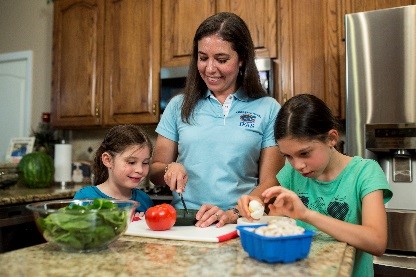
Dine In with Family
To help you make the pledge to Dine In with your family December 3rd, go to http://www.aafcs.org/fcsday/commit-to-dining-in/fcs-day-sign-up and make your very easy commitment today. After that, see how many more Dine In days you can make with your family.
To learn more about the Benefits of Family Meals, read http://edis.ifas.ufl.edu/pdffiles/FY/FY136200.pdf
by Pam Allen | Nov 18, 2017
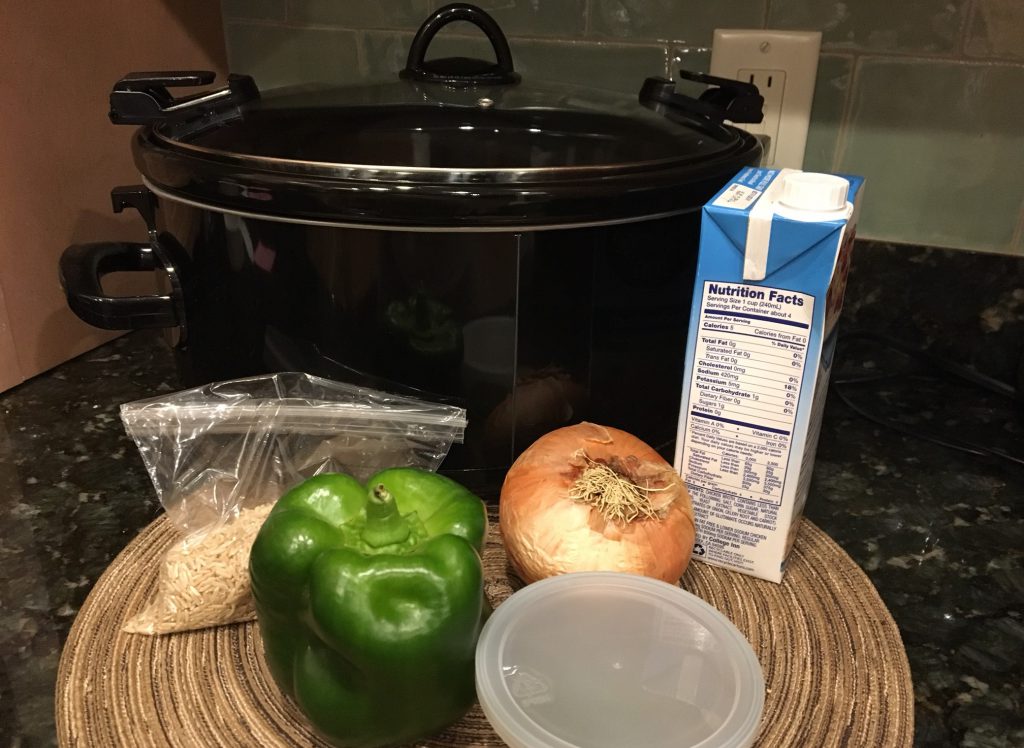
Slow Cooking
Photo credit: Pamela Allen
With the weather changing and cooler temperatures on the way, get out the slow cooker for simmering soups and stews that will be waiting for you when you get home. Slow cookers are popular and allow us the convenience of prepping ahead of time and having a hot cooked dish when we get home from a long day of work. The advantage of slow cooking is to set it and then forget it. Stirring is not usually required and remember to keep the lid on as the food simmers. Today’s slow cookers are food safe and keep food at a safe temperature of 170˚F to 280˚F. The low heat allows use of less expensive and leaner cuts of meat as the slow cooking will tenderize and shrink less.
Cooking with a slow cooker means planning ahead but the payoff is a great meal. You can prepare all the ingredients the night before like chopping of vegetables, cutting up the meat and gathering the other items and have them handy for the next morning. Remember to refrigerate all items needing refrigerating until it is time to place in the slow cooker.
Here are some tips or using your slow cooker safely and economically.
- Start with a clean cooker and utensils. Always use a clean work area and make sure to wash your hands during the preparation.
- Keep perishables refrigerated until ready to use. Store meat and vegetables separately if preparing ahead of time.
- Always thaw meat or poultry before putting it into a slow cooker. If frozen pieces are used, they will not reach 140° quick enough and could possibly result in a foodborne illness.
- Keep in mind to not lift the lid unnecessarily during the cooking cycle. Each time the lid is raised, the internal temperature drops 10 to 15 degrees and the cooking process is slowed by 30 minutes.
- After enjoying your meal, do not leave cooked food to cool down in the cooker. Store leftovers in shallow containers and refrigerate immediately.
- Do not overload the slow cooker. Fill to a minimum of 1/2 full and a maximum of 2/3 full.
Try some of these favorite recipes to get you started:
Hamburger Soup
2 pounds lean ground beef, browned and drained
2 teaspoons dried basil
2 teaspoons dried oregano
2 teaspoons garlic powder
5-6 cups tomato juice
1 cup stewed tomatoes
1 large onion, chopped
2 cups chopped celery
1 cup sliced carrots
2 cups sliced green beans, fresh or frozen
1 tablespoon Worcestershire sauce
salt & pepper to taste
Place browned meat in slow cooker. Add all remaining ingredients and stir to mix well. Cover and cook on LOW for at least 5 hours. Makes 6 servings.
Old-Fashioned Chicken & Rice
2½ cups chicken broth
1½ pounds boneless, skinless chicken breast meat, cut into 1-inch pieces or strips
1½ cups long grain rice, uncooked
¼ cup fresh parsley, minced or
1 tablespoon dried parsley
1 cup chopped onion
6 garlic cloves, minced
1 small red bell pepper, cut into thin strips
1 (6-ounce) jar sliced mushrooms, undrained
¼ teaspoon poultry seasoning
Combine all ingredients in slow cooker. Cover and cook on HIGH for 3-4 hours, or until chicken is no longer pink and rice is plumped tender.
Favorite Beef Stew
3 carrots, sliced
3 potatoes, cut in 1-inch cubes
2 pounds beef stew meat, cut in 1-inch cubes
1 cup beef broth
1 teaspoon Worcestershire sauce
1 clove garlic, minced
1 bay leaf
salt to taste
Combine all ingredients in slow cooker in order listed. Stir just enough to mix seasonings throughout. Cover and cook on LOW for 10-12 hours, or on HIGH for 5-6 hours. Makes 6-8 servings.

by Heidi Copeland | Sep 12, 2017
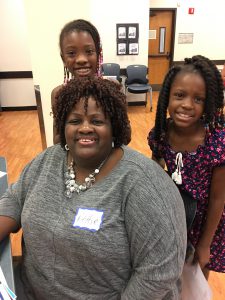 For nearly 40 years, National Grandparents Day has been celebrated as an opportunity to express gratitude for all that grandparents do for families and communities. According to the U.S. Census Bureau Profile, America Facts for Features, in 1970, Marian McQuade initiated a campaign to establish a day to honor grandparents. In 1978, President Jimmy Carter signed a federal proclamation, declaring the first Sunday after Labor Day to be National Grandparents Day.
For nearly 40 years, National Grandparents Day has been celebrated as an opportunity to express gratitude for all that grandparents do for families and communities. According to the U.S. Census Bureau Profile, America Facts for Features, in 1970, Marian McQuade initiated a campaign to establish a day to honor grandparents. In 1978, President Jimmy Carter signed a federal proclamation, declaring the first Sunday after Labor Day to be National Grandparents Day.
Across the U.S., not only are grandparents appreciated for sharing their time, wisdom, and values, but they are currently stepping up to raise over 7.2 million children under the age of 18 whose biological parents are unable to do so, thus keeping the children out of the foster care system. In Florida, 11% of children live in homes where householders are grandparents or other relatives.
Locally, in Leon County, there are more than 2,000 grandparent-headed families, where:
- 13.1% of the grandparents are 60 years and older
- 39.8% of these families live below the poverty level
- Nearly 50% of these families have had the children for 5 or more years
The reasons as to why so many grandparents are raising grandchildren are many and varied. Nationally, substance abuse causes more than one third of this type of placement. Nevertheless, because of a grandparent’s selfless devotion and generosity to the needs of others, grandparents are, in fact, owed a great deal of thanks for their altruism.
As one grandmother exclaimed, “For my 50th birthday, I got a 2 year-old. My story isn’t unique.” In fact, grandparent roles in children’s lives are so significant that the Grandparents as Parents (GaP) Program of the Tallahassee Senior Foundation, funded by the Leon County Commission, grants, and donations, has a program and support group just for them! According to Karen Boebinger, GaP Program Coordinator, “The GaP program provides moral support and resource assistance to these grandfamilies who are trying to navigate through their new lifestyle.”
AARP® has streamlined the gathering of relevant information pertinent to this nationwide dilemma. The AARP® resource, Grand Families Fact Sheet, includes state-specific data and programs available, as well as information about public benefits, educational assistance, legal relationship options, and state laws. This fact sheet also contains many other resource tools such as the National Council on Aging’s questionnaire that helps grandparent caregivers and/or the children they are raising determine if they qualify for certain programs that pay for food, an increase in income, and/or home and healthcare costs. Once the questionnaire is completed, the website generates a list of eligible programs and contact information. (www.aarp.org/quicklink)
Take a moment today and every day to give thanks and appreciation for the thousands of grandparents in our community and around the country for the service they do for children. One thing is for certain: grandparents are more valuable to their grandchildren and communities than ever. Grandparents are indispensable and important people.
Want more information about supporting GaP or do you need support yourself? Contact Karen Boebinger, GaP Program Coordinator, at 850-891-4027 or karen.boebinger@talgov.com.
by Marie Arick | May 27, 2017

photo credit Flickr
Though the celebration has been connected to many different religions and dates, Father’s Day has been celebrated since the Middle Ages. The Father’s Day holiday became a national holiday in 1972 thanks to President Nixon and is officially celebrated on the third Sunday of June. No matter the date celebrated, the purpose of honoring our father is unchanged. Many of us have lost our father, but some of us have been fortunate enough to have another male figure present in our lives that continues to represent this to us.
In today’s world, celebrating our ‘Father,’ the parenting he has provided, and the contributions that have helped shape our lives, is truly important. Each father’s or father figure’s impact is different and influences the recipient in their own special way. Can you reminisce right now and think of one important thing this influential person has said to you that has influenced you to this day? I can! My father simply stated this once during a conversation: “things don’t bother me, people bother me.” It struck me as so profound and simply true. I have remembered that statement to this day and repeated it many times to so many others. Were there other words of wisdom he shared with my brothers and me? Yes, and it seems so strange that we all remember different profound things.
Use this day to express your love and gratitude. Reflection and sharing are the best way you can honor someone. If they are no longer with you, celebrate them by sharing a fond memory or profound moment with others.
Sure, keep the tradition of gifting a tie if you like, but add a note of appreciation describing an influential moment or memory you carry. The beauty of sharing an influential life changing moment is priceless.

by Kendra Hughson | May 5, 2017

Family rituals and traditions, like family vacations, make lasting memories.
This will be my sixth Mother’s Day, so I am not an experienced mother by any stretch of the imagination. As a Family and Consumer Sciences Extension Agent, I am fortunate to have plenty of coursework and some practical experience in working with children– but real life is different. Here are a few of the things I have learned – from coursework and just a little bit of experience:
Every stage of childhood brings a new joy and a new challenge. Understanding child development can help parents know what to expect and how to handle challenges. Extension is a great resource for child development. We have fact sheets on all ages and stages of development. You can find them in our Electronic Data Information Source (EDIS) publications. Search them here: http://edis.ifas.ufl.edu/topic_child_development
Finding effective discipline techniques and sticking to them also is a challenge. Children need consistency. I have found that focusing on good behavior and having clear, consistent rules makes life much more peaceful. Now that my child is in school, we use a simple chart with just two or three items and use colored dots, similar to what my daughter is used to in school. This keeps it consistent and focused on the positive behaviors I want to see. My daughter is excited to earn privileges and the reward of good behavior dots or stickers. Our UF/IFAS Extension site has some great ideas for discipline too. Find them here: discipline resources.
Children need routines. I think adults do, too. Having a routine and sticking to it helps children know what to expect. Those family rituals and traditions are just as important for building family stability and a sense of belonging. They make for great family memories! Don’t forget to make time for bedtime stories, making cookies, or for family celebrations, like Mother’s Day.
I am not an expert at parenting. I have made mistakes, some big, some little. When I do need expert advice, I go back to what I have learned from my work in Extension. Extension has all the research-based information you can trust on parenting and a variety of other topics. Check it out: edis.ifas.ufl.edu.










